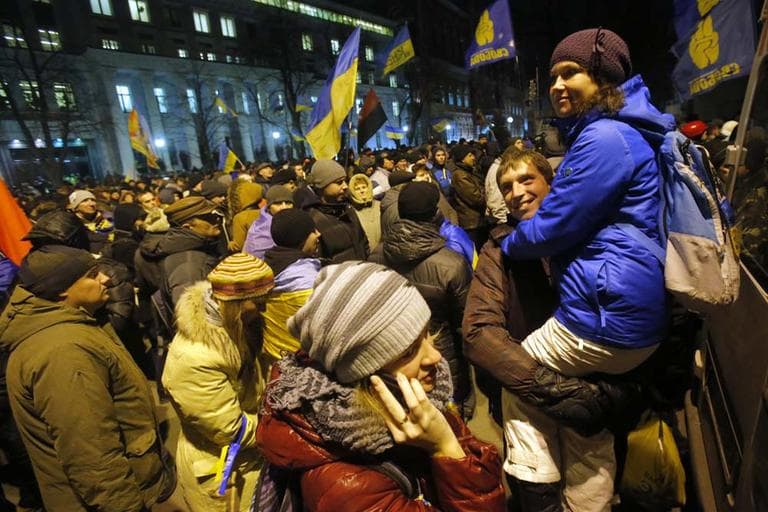Advertisement
Ukraine Splits Over East-West Economic Rivalry
ResumeThe battle over Ukraine. The reach of the West. Russia’s sphere of influence. Ukrainians in the streets.

In a flash, Ukraine’s capital looked like old Orange Revolution or even Berlin Wall-toppling days last weekend. Massive crowds, brutal police, an East-West tug-of-war. A certain Cold War cast and a touch of Soviet power play. But this was completely up to date. Ukraine’s government turned away from a European Union tie. Toward Russia. And a whole lot of Ukrainians took to the streets to say no. No to Moscow. Yes to Western European values. But it’s complicated. Ukraine is right in the middle. This hour On Point: old ties, new ties, and the fate of Ukraine.
-- Tom Ashbrook
Guests
Sergei Loiko, Moscow correspondent for The Los Angeles Times, covering the protests in Kiev.
Serhii Plokhii, professor of Ukrainian history at Harvard University. Author of "Ukraine And Russia; Representations of the Past" and "The Origins of the Slavic Nations: Premodern Identities in Russia, Ukraine and Belarus."
Gwendolyn Sasse, professor of politics and international relations at the University of Oxford. Author of "The Crimea Question: Identity, Transition And Conflict," "Europeanization and Reorganization in the EU's Enlargement to Central and Eastern Europe: The Myth of Conditionality" and "Ethnicity and Territory in the Former Soviet Union: Regions in Conflict."
Alisa Ruban, organizer in the Ukrainian protests. International secretary for the Democratic Alliance, a Ukrainian opposition party.
From Tom's Reading List
Los Angeles Times: Ukrainian opposition fails to pass no-confidence vote in parliament — "After several days of of mass protests over President Viktor Yanukovich's refusal to sign the trade and association agreement with Europe, the opposition leaders counted on support from communist lawmakers and defectors from the ruling Party of Regions faction to pass the measure. A vote of no confidence was seen as a first step in bringing down the government."
Reuters: Ukraine government survives in parliament while rage boils outside — "The government's November 21 decision to reject a deal on closer trade ties and integration with the EU has laid bare once more a split in world view between Ukraine's Russian-speaking East and Ukrainian-speaking West.Protesters see the rejection of the EU trade deal as a fundamental shift in the future outlook of their country, away from the European mainstream and back into the orbit of their former Soviet masters in Moscow."
The Economist: Battle for Ukraine -- "Ukraine is not Belarus. It has a vibrant middle class, television is controlled by oligarchs (many of whom are extremely angry with Mr Yanukovych) and, most importantly, a diverse population. Although Mr Yanukovych, whose popularity rating is less than 20%, is still backed by his native Russian-speaking industrial region of Donetsk, he has never had much legitimacy in the Ukrainian-speaking west of the country. His latest actions could lead to a split in the country, with its western part and Kiev simply refusing to recognise the government's authority."
This program aired on December 4, 2013.